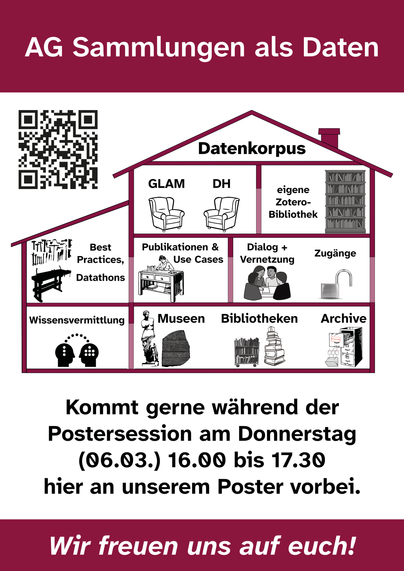We are proud to be Co-founders of the all new "Geo-Chem-Life Science Helpdesk Cluster", a network of #helpdesks of 10 consortia within the #NFDi - to provide exchange of sector-specific knowledge: https://t1p.de/r6yo3 #NFDI #fairdata #Forschungsdaten
Recent searches
Search options
#nfdi
Check out our new PID icons!
We've created a set of icons to visually represent Persistent Identifiers (#PIDs) and their use cases—from datasets and software to researchers and grants!
Improving data discoverability, facilitating visual analysis, and promoting a more unified understanding of research information.
Check out the full collection and and carry it into the world!
https://doi.org/10.5281/zenodo.15173234
#PIDNetwork #RDM #RDA #FAIR #OpenScience #OpenData #NFDI @pid4nfdi
I've only found out today the current @datacite metadata schema (releaset December 2024) has fields for spatial coverage and temporal coverage of research data. This will be useful for @nfdi4objects and #nfdi in general!
Liebe @dh_berlin -Community, am Freitag findet der nächste DH-Stammtisch statt!
Wir treffen uns Fr., 4.4., 18:00 Uhr, in der Tiergartenquelle am S-Bahnhof Tiergarten. Es ist ein Tisch auf meinen Namen reserviert.
Bitte gebt mir kurz Rückmeldung, ob ihr dabei seid, damit ich die Reservierung anpassen kann. Freue mich wieder auf Gespräche rund um #DigitalHumanities, #DigitalHistory, #DigitalHeritage , #DigitalArchaeology, #DigitaleEditionen, #FDM, #NFDI und die Lage der Welt. #dhberlin
Informationen zum Cluster finden Sie in unserem Portal: https://www.nfdi4objects.net/portal/ccs/cc3_authority_and_norm_data/.
Wir freuen uns auf den Austausch mit Ihnen. Bitte geben Sie die Einladung sehr gern an interessierte Kolleg:innen weiter.
#NFDI #NFDIrocks #Forschungsdatenmanagement #FDM #RDM #Terminologien #Normdaten #Vokabulare #Begriffslisten #Glossare 2/2
Ein kleiner Lichtblick in den #Koalitionsverhandlungen, auf den #NFDI4Culture @nfdi4culture zum Glück letzte Woche aufmerksam wurde:
https://fragdenstaat.de/dokumente/258028-koalitionsverhandlungen-cdu-csu-spd-ag-8-bildung-forschung-und-innovation/ Zeile 230:
> Wir werden die Aktivitäten für die NFDI verstetigen.
Wäre wirklich ne Idee, der Forschungslandschaft und den in der #NFDI Tätigen und aus NFDI-Mitteln Finanzierten ne akzeptable Perspektive zu geben. #IchbinHanna können leider auch dort viele sagen.
Danke fürs Veröffentlichen, @fragdenstaat! Ohne Euch wär alles noch dusterer!
We would like to congratulate the Rat für Informationsinfrastrukturen (#RfII) on its 10th anniversary!
Yesterday, this special birthday was celebrated in Berlin.
The history of #NFDI began with the RfII: In 2016, the Council formulated the need for a coordinated research data infrastructure for Germany. The recommendation paper ‘Performance from Diversity’ ("Leistung aus Vielfalt") can be regarded as the conceptual birth of NFDI.
Photos: RfII
Vielen Dank, @DrKEichhorn für den Hinweis auf diesen gewohnt reflektierten und ausgewogenen Artikel von @JMWiarda
Das ist es eben - wir haben Spitzenforschung in Deutschland (v.a. in den außeruniversitären Forschungszentren), aber wenig sichere Karriereoptionen für die zweite Reihe und den Nachwuchs - der deshalb oft ins Ausland, auch die USA geht. Nur für diese wäre eine Rückkehr überhaupt interessant. Aber auch denen fehlen Strukturen, die hier mit den #NFDI-Initiativen gerade erst
@Lambo
Jetzt bewerben: "Schriftkulturen des Mittelalters in digitaler Perspektive" - Ein Cross-NFDI-Graduiertenworkshop. Eine Veranstaltung der #StabiBerlin mit dem #Münzkabinett der Staatlichen Museen zu Berlin und den Konsortien #4Objects (Community Cluster Objekte als Inschriftenträger) sowie #4Memory der Nationalen #Forschungsdateninfrastruktur (NFDI). Alle Infos zu Bewerbungsfristen und #Programm https://blog.sbb.berlin/termin/mittelalterliche-schriftkulturen-in-digitaler-perspektive/
#Ausschreibung zur 2. Förderphase der #NFDI-Konsortien! Zum Antrag berechtigt sind ausschließlich die seit 2021 geförderten 10 Konsortien der 2. Ausschreibungsrunde. Sie können sich für weitere 5 Jahre bewerben mit dem Fokus auf Konsolidierung.
@NFDI Alle Infos & Fristen: https://www.dfg.de/de/aktuelles/neuigkeiten-themen/info-wissenschaft/2025/ifw-25-23
@kubikpixel Exactly what I had to read to gain some additional understanding needed for what I am currently working on during my day job! Thank you so much for linking this.
#musicology #DigitalHumanities #DigHum #RSEng #DHRSE with shoutouts to #NFDI #NFDI4Culture #OpenAccess
#whyNFDI? To unlock the power of high-dimensional microscopy data.
#Microscopy is one of the cutting-edge technologies in research. We need new ways to unlock the potential of the highly complex data generated in this process.
@nfdi4bioimage sets new standards for sharing and re-utilising this data. With developers worldwide, a new file format is being created and the associated metadata is also being structured and preserved.
More: https://nfdi4bioimage.de/about-us/goals-and-task-areas/ta1/
Nach der #DHd2025 ist vor dem Stammtisch #DHBerlin
.
Für den 14. März 2025, 18:00 Uhr, sind 10-15 Plätze im Erdinger am Gendarmenmarkt auf meinen Namen reserviert. Meldet Euch bitte, wenn Ihr dabei seid, dann kann ich das noch anpassen.
Wir finden uns auch im aktuellen Newsletter von @nfdi4objects wieder.
Am Donnerstag trifft sich die #DHd AG #Sammlungen als #Daten auf der @DHdKonferenz #DHd2025. @digiSberlin, @nfdi4culture, @NFDI4Memory und @NFDI4Objects sind auch dabei. Kommt gern am Donnerstag während der #Postersession ab 16 Uhr vorbei, wir freuen uns auf den Austausch.
#Objektdaten #kulturerbe #DigitalHumanities #digitalheritage #Archäologie #GLAM #nfdirocks #nfdi #nfdigoesdhd @celiakrause @lavaeolus @awinkler @geho
Posterdesign: @lavaeolus
Liebe Teilnehmende der @DHdKonferenz https://nfdi.social/, es sind noch 4 Plätze frei für unseren Workshop zur "#Objektbiografie – Ein Ansatz für die integrative #Datenmodellierung: Eigenschaften, Chancen und Anwendungsmöglichkeiten". Kurzentschlossene sind herzlich wilkkommen, meldet Euch gern bei mir!
https://nfdi.social@nfdi4objects/114040975554525832
Meanwhile in Karlsruhe...
Yesterday, our colleague Hossein Beygi Nasrabadi from the @fizise presented a joint paper at Hashtag#SEconf25 at @KIT_Karlsruhe.
Hossein presented "The NFDIcore Ontology and Related Modular Domain Ontologies", a joint work of himself along with our colleagues @tabea, @sashabruns, Etienne Posthumus, Jörg Waitelonis, @lysander07 Sack and others.
#Ontologies #KnowledgeGraphs #KG #NFDI #RDM #Datenliebe #meanwhileinAcademia #teamFIZ
@NFDI4DS @nfdi4culture @NFDI4Memory
#WhyNFDI? To accelerate the energy transition with data.
The energy transition is crucial to tackling the climate crisis.
@nfdi4energy promotes efficient research data management in the energy sector, improves collaboration between research and industry and drives innovation.
With open, interoperable data infrastructures, @nfdi4energy supports sustainable energy systems and accelerates research on renewable energies.
Florian Thiery @fthierygeo gives a talk on "Research Squirrel Engineers: How an independent RSE-driven network may help the NFDI" at #deRSE25 at @KIT_Karlsruhe which also tackles @NFDI #Base4NFDI - Basic Services for the NFDI topics on Research Software Engineering within the #RDM and #CAA_DE community of computational archaeology.
More informations here: https://zenodo.org/records/14914288.



